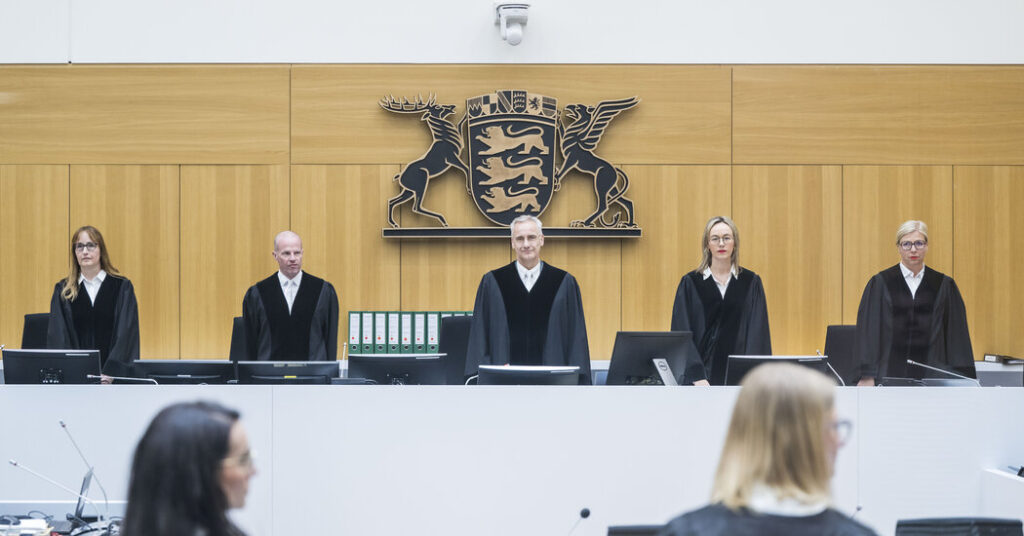Prince Heinrich XIII of Reuss, an unknown aristocrat who wanted to become Germany’s chancellor, and eight men and women who planned to violently overthrow the government to put him in power will go on trial in Frankfurt on Tuesday.
The prince and his masterminds will begin facing legal action after a massive nationwide raid involving 3,000 police officers at 150 locations nearly a year and a half ago that authorities said foiled a bizarre far-right plot to seize power. . It is expected to be one of the most complex court cases since the trial of Auschwitz concentration camp commanders in West Germany in the 1960s.
In a hastily constructed makeshift court on the outskirts of Frankfurt, the nine defendants will meet for the first time since most of them were arrested in December 2022. witness testimony.
Members of the group, who call themselves United Patriots, believe the government is run by pedophile, illegal politicians who have access to a network of underground military bases. Prosecutors said the plotters believed there was a secret alliance of sympathetic foreign intelligence agencies, including those belonging to the United States and Russia, that would help the group overthrow the deep state if a signal was sent.
The defendants were members of a group within the Reich Citizens Movement, which considered the modern German state to be illegitimate. Long considered a nuisance by simply disobeying local laws and refusing to pay taxes, the movement, whose members authorities believe numbers at least 23,000, has become increasingly radicalized over the years.
“Militant ‘reich citizens’ are driven by hatred of our democracy,” German Interior Minister Nancy Feser said in a statement on Tuesday. “Our security services will continue to repress until we fully expose them.” and dismantling the radical ‘Reichsbürger’ structure.”
The massive trial in Frankfurt is just one of three lawsuits stemming from the conspiracy. Federal prosecutors have indicted 27 people, charging that the core group of the conspiracy was too large to fit in a single courtroom.
A trial began in Stuttgart last month focusing on nine men who could be classified as part of the military wing of the operation. Eight people suspected of masterminding the conspiracy, who federal prosecutors say provided financial support, will go on trial next month in a high-security court in Munich. A 27th suspect died in prison while awaiting trial. Experts say the trial could take years to reach a conclusion.
Prosecutors said the nine defendants in Frankfurt represented the coup’s leadership in what was arguably the most important trial. Several men scheduled to appear in court in Frankfurt on Tuesday have been charged with founding the terror group; prosecutors said others were members of a leadership committee appointed to form the cabinet that would answer to the prince if the coup was successful. Two women appeared before the five-judge panel accused of seeking Russian support for the coup.
“This trial will provide insight not only into the preparations but also into the alleged terrorist group’s links to Russia,” said Jan Rathje, who studies the Reich Citizen Movement for an NGO that monitors extremism and the far right. .
But authorities say that despite their idiosyncratic beliefs, the group’s members pose a real danger. Authorities found 380 guns and 350 other weapons such as knives, axes and clubs. They also found 148,000 rounds of ammunition, explosives, military helmets and protective gear, as well as gold and cash worth 500,000 euros (about $543,000).
The group’s two founders, Rüdiger von Pescatore and Maximilan Eder, are both retired military officers; prosecutors said the court found Michael F., who was interior minister in the post-coup regime and an active criminal police chief inspector, under Germany’s strict privacy laws. Birgit Malsack-Winkemann is a judge who was elected to the Bundestag for a four-year term in 2017 as a far-right candidate. Johanna F.-J. Participated in protests against pandemic regulations.
The defendants adhere to a worldview composed of QAnon-type mythology and far-right historical revisionism of the pre-World War I German Empire.
According to prosecutors, in the summer of 2021, the group planned to overthrow the government by entering parliament and arresting senior politicians. A video showing the capture of German Chancellor Olaf Schulz will be broadcast to the nation as a result of the successful coup. Prosecutors said 286 “Homeland Security Forces” would then be tasked with controlling the population, even if that meant killing or imprisoning those who resisted the new leadership.
Prosecutors allege that to plan the rebellion, the group’s “committee” met regularly at one of the prince’s old hunting castles.
Prosecutors plan to prove that former judge Ms. Marsak-Winkelmann used her security clearance to bring former colonel Mr. Eder and others into the Reichstag, the main building of the federal parliament. Prosecutors say many of the country’s top politicians, who were operating without security, scouted the area in preparation for the initial attack.
The extensive organization and bureaucratic care behind the coup attempt helped investigators build their case. At a hearing in Stuttgart last month, for example, prosecutors presented copies of oaths signed by members pledging not to disclose information about the group’s executions.
Although he did not appear to have founded the movement that promised him a national leadership role, the prince took an important leadership role early on, prosecutors said. Due to his family’s pretensions to the line of German Emperors, whose reign ended with the catastrophe of World War I, he was considered the ideal leader of the group.

